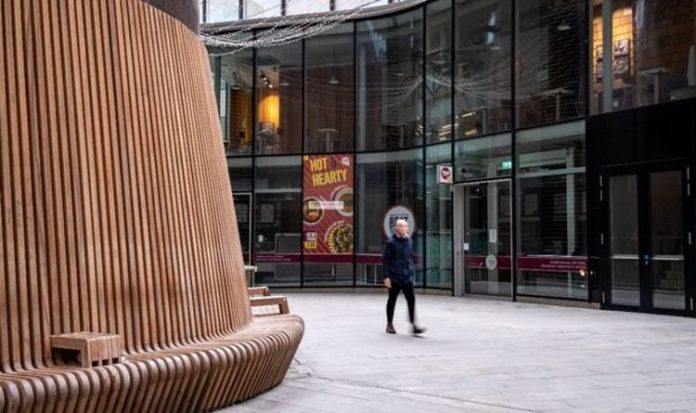Redundancies increased by 114,000 quarter-on-quarter to 227,000 after employers laid off staff ahead of the end of the furlough scheme this month. An estimated 1.52 million people were out of work in June to August, according to the Office for National Statistics (ONS). The figure was up by 138,000, jumping to 4.5 percent from 4.1 percent in the previous three months.
But the records contained some signs of recovery with real-time figures showing a 20,000 increase in the number of UK workers on company payrolls last month, the first since the lockdown in March.
Job vacancies also increased by a record 144,000 to 488,000 between July and September.
The ONS also said regular pay, excluding bonuses, grew by 0.8 percent in the three months to August.
Chancellor Rishi Sunak insisted the Government’s Plan for Jobs, a type of localislised furlough scheme, will help protect employment and “ensure nobody is left without hope”.
Under the new “safety net” for businesses ordered to close in the highest risk areas, the Government will pay two-thirds of each employee’s salary up to a maximum of £2,100 a month.
Mr Sunak said: “I’ve been honest with people from the start that we would unfortunately not be able to save every job.
“But these aren’t just statistics, they are people’s lives.

Redundancies increased by 114,000 quarter-on-quarter to 227,000 (Image: James Linsell-Clark/SWNS)
“That’s why trying to protect as many jobs as possible and helping those who lose their job back into employment, is my absolute priority.
“This is why we put together an unprecedented £190 billion package of support and have a comprehensive Plan for Jobs.”
The ONS figures showed overall employment is down by 482,000 since the start of the year, with young people hit hardest as 16 to 24-year-olds account for 60 per cent of the fall.
Universal Credit went up by one per cent in September to 2.7 million, taking the total increase since March to 1.5 million.
Jobs are mainly being lost in hospitality, administration and support services, which includes employment and travel agencies.
Jonathan Athow, deputy national statistician at the ONS, said: “Since the start of the pandemic there has been a sharp increase in those out of work and job hunting but more people telling us they are not actively looking for work.
“There has also been a stark rise in the number of people who have recently been made redundant.”
Business leaders and trade unions warned the government it will need to give more financial support to businesses hit by tougher lockdown restrictions.
Carolyn Fairbairn, director-general of the CBI, said: “It certainly remains true that business is desperate to avoid another national lockdown,” she said.
“Now it’s about financial support. It really is about getting the right financial support packages in place. There may need to be more done.
“We are also seeing the jobless figures rising. This is turning into the unemployment crisis that I think we feared.”
Tej Parikh, chief economist at the Institute of Directors, said: “With the furlough scheme unwinding, cash-strapped firms have been forced into difficult decisions about retaining their staff.
“Demand remains weak and as restrictions ramp up again many businesses will be stretched when it comes to paying wage bills.
“The Job Support Scheme may need to be beefed up if the Government wants to avert further rises in unemployment.”

TUC general secretary Frances O’Grady (Image: Ian Forsyth/Getty Images)
TUC general secretary Frances O’Grady said: “We are on the precipice of an unemployment crisis.
“Ministers must act now to protect and create jobs.
“The expansion of the job support scheme is a step in the right direction, but it still falls short.
“Wage replacement should be 80 percent for businesses who have to shut.”
Fears about the impact the response to the crisis is having on the economy were raised in the Commons.
Conservative MP Sir Edward Leigh accused the Government of “forcing” more and more businesses out of business.
“We are going bankrupt as a nation, there won’t be the money to pay for the NHS or pensions,” he added.
Tory MPs urged the Government to offer financial support to hospitality businesses in areas hit by tier two restrictions who are “open in name only” because different households are forbidden from mixing indoors.
Conservative Alec Shelbrooke urged ministers to look at extending the available help “before this industry is destroyed”.
Tory Julian Sturdy said trade body UK Hospitality has reported a dip in trade of up to 60 percent when indoor mixing is banned.
He called for an urgent review of the help on offer to businesses in tier two who are “going to really struggle to stay open”.
Chief Secretary to the Treasury Stephen Barclay said the Government must balance the health measures with the fiscal cost.
“I hear the concerns but there is a balance that needs to be struck between the comprehensive nature and the fiscal cost of the range of packages that we have put in place and the measures that we take in terms of controlling the virus.”







